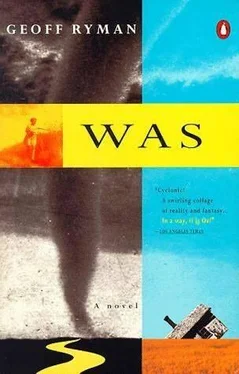Dorothy looked and saw the hollow eyes, the somewhat surprised and empty face that seemed to ask what had happened to itself. Where had it gone? Dorothy knew it was the truth. Her mother had no flesh now, or eyes, in the ground. Aunty Em wept, and Toto trotted back away, revenge taken. Dorothy saw him go, his tiny legs strutting across the gray mud, between the rounded gray humps.
Uncle Henry kept a shotgun leaning in the corner.
Toto did not show up for a day or two. Dorothy knew enough not to mention him. She thought he was hiding, keeping low for a while. He was such a clever dog.
But how low can you keep without disappearing, until you fade into less than a memory? When almost a week had passed, Dorothy asked if Aunty Em had seen Toto while she was away at school.
Aunty Em was scrubbing. "No, I haven't," she said, lightly.
"He's been gone a long time."
"I expect he's gone away," said Aunty Em, not looking at her.
"He wouldn't do that," said Dorothy.
"Well, he kept staying away for longer and longer," said Aunty Em.
But he wouldn't leave her, he wouldn't leave Dorothy, she knew that.
"Why would he run away?"
"Guess he didn't like it here."
Dorothy slumped down onto her mattress. Aunty Em couldn't stand it when anyone else cried. If anyone had a right to cry, it was Aunty Em. She looked around the edge of the blanket.
"There's no point going against the will of God, if that's what He's decided," said Aunty Em. Aunty Em looked at the good little girl who was so unhappy and relented a bit.
"Toto wasn't happy here, Dorothy. That's why he kept barking all the time and running off and did all those terrible things. So, I reckon he's gone off to find somewhere happier. Maybe he's gone off to find your old house in St. Louis. Maybe he thinks your mama's there. He's a dog and doesn't know any better."
"He wouldn't leave me!" said Dorothy.
"Well he has, and there's no way around it but to get used to it," said Aunty Em. Dorothy heard her boots on the floor as she walked away.
Dorothy waited for Toto to come back. Maybe he had gone away because he knew he was bad and would come back when he thought he had been forgiven. Maybe you could find out you were bad, and go away from shame and come back when you were good again.
Every day after school, when she came to the track that led to the farm, she would expect to see him again. Maybe this time, maybe this time, she thought every day all through the rest of that March, into April, into the fullness of the Kansas spring. From time to time, she would call his name, expecting to find him lying close to the ground, ready to spring up and run yipping to her.
She knew just how she would feel when that happened. She knew there would be a leaping up of joy inside her, and she would say "Good Toto, good boy, good Toto," and he would roll over and over and over, like he always did when he was especially glad to see her. That would happen, and everything would be all right.
Whenever she heard a dog barking at night, the sound coming across the Kansas hills, she thought it was Toto. She would get up.
"Dorothy. Where are you going?" demanded the voice in the darkness.
"I think it's Toto," she would reply. "I think he's come back."
"It's not Toto. Get back to bed," the voice would order.
And Dorothy would slink guiltily back onto her bed, in an agony in case Toto came back and found no one there to greet him. She learned how to slip out of the window, into the cool spring night in just her nightgown.
"Toto?" she would whisper, teeth chattering, icy mud between her toes. "Toto?"
She started hiding her boots under the mattress. She would go out and hunt for Toto at night, stumbling across the Kansas plain, following the sound of the dogs. She would be sure that he was just a field or two away, lost, not quite able to find the tiny single-room house in the wide flat valley.
One day after school, Uncle Henry met her at the crossroads and they walked together.
"You're still worried about Toto, ain't you?" he said. His kindness was inseparable from his smell. He still reeked, and there was food in his beard.
"When he can't find my mama, will he come back here?" she asked.
"Well," he said. "It's possible that Toto is dead, Dorothy."
Dorothy saw the bedraggled fur, the empty eyes.
"If he is, then he's with all the other good little dogs in Heaven, and we should be happy for him."
Dorothy said nothing.
"So maybe he has found your mama," said Uncle Henry. "And your little brother. Maybe they're all together, just like they used to be."
"Maybe Wilbur's there too," she said. She still thought of Wilbur sometimes.
"I should think that's right," said Uncle Henry. "So you say your prayers, and be a good little girl, you'll join them one day. They'll be waiting for you at the gate."
"By that time I'll be too old, and I won't care," said Dorothy.
But she didn't stop hoping. She just knew she had to hide it. Whenever she heard a dog bark, she would look up in hope.
But in another sense, Toto was always with her, silent and invisible, bouncing and spinning around her as she walked to and from school, or sleeping by the rusty stove while Dorothy did her homework. She could almost feel him, tiny and coarse-haired, growing warmer next to her at night.
She told stories to herself to account for why he was still there. She could see the stories happening very clearly. There were thieves and they came and tied Aunty Em up and were going to steal money from the tin box behind the flue, but Toto came back and saw them and fetched Uncle Henry, and the thieves were foiled, so Toto was a hero. Aunty Em let him lick her face.
Dorothy daydreamed many things, walking back and forth from the crossroads. She daydreamed that an angel came down, right in the middle of school, where all the other children could see her. And the angel said that because Dorothy was so good, she could have three wishes. And Dorothy would wish that her mother was back, and that her father came back, and that they all lived together in St. Louis. And the angel would smile and say, "Your wishes are granted," and there would be a great wind that would pick Dorothy up and blow her through the sky, back home.
She daydreamed the size of gravestone she would have. She thought that gravestones were earned by goodness, rather than paid for by money, and she imagined her gravestone, as big as a house, with angels carved all over it. Then she felt guilty because she knew her mother didn't have one like that.
She felt guilty remembering her mother. To dream that her mother was back, rocking Dorothy in her lap, singing to her, divided Dorothy in two. Because the mother who Dorothy remembered, soft-faced with pursed lips, was nothing like the mother Aunty Em talked about. She wasn't wild, she was hardworking. She had to practice the piano and she had to rehearse. She wasn't a poor, silly little thing. She was sensible and kept a cleaner house than Aunty Em did. She was often away and tried to make it up to Dorothy. Dorothy remembered her mother kneeling down on the floor with her to make cakes in the shape of men with sugar faces. She was sure she could remember her mother and her father having a snowball fight in the park. She could also remember her mother on the settee, sobbing, clasping her hands and saying, "Dear God, please don't let me ask him back. Don't let me call him back." Outside on the street her father was walking away.
To imagine she was back with her mother would remind Dorothy that something was wrong. Aunty Em was wrong. And Dorothy loved her Aunty Em. She had to love her. Everything depended on Aunty Em now. Her mother may have been beautiful and kind and sometimes terrible, but she couldn't help Dorothy. She wasn't there.
Читать дальше












